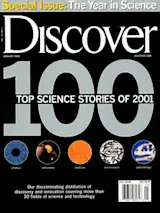• Priceless ZirconIn a jewelry store, a zircon can pass as a cheap diamond. But a speck of zircon found in the Australian outback is proving priceless to geologists. In January, a team of researchers reported that this crystal was dated as Earth's oldest known rock—at around 4.4 billion years old. Although no bigger than a grain of sand, it contains valuable clues to when and how our planet took shape. Many geologists used to believe that Earth was a roiling mass of molten rock for the first 300 million years of its existence. But the zircon found by Simon Wilde, a geologist at the Curtin University of Technology in Perth, was formed just 160 million years after Earth itself. If the crystal could form so early in Earth's history, the planet's surface must have cooled and hardened considerably faster than researchers had suspected. The oxygen within the zircon tells ...
Geology
Year In Science
More on Discover
Stay Curious
SubscribeTo The Magazine
Save up to 40% off the cover price when you subscribe to Discover magazine.
Subscribe













